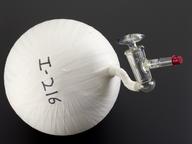

Fridge used in conjunction with mechanical tree prototype, 2017
- Made:
- 2017 in unknown place
Fridge, Igloo Model FR 2831-B, used in conjunction with mechanical tree prototype for direct capture of carbon dioxide from the air, which was designed and built by Klaus Lackner’s team at the Center for Negative Carbon Emissions, Arizona State University, Tempe, Arizona, USA, 2017. When the tree prototype was tested in 2018 in Phoenix, Arizona, intense heat caused the computing system to fail. The team used this fridge to keep the components cool during operation.
This fridge was used during tests of the mechanical tree prototype for direct capture of carbon dioxide from the air, which was designed and built by Klaus Lackner’s team at the Center for Negative Carbon Emissions, Arizona State University, Tempe, Arizona, USA, 2017
The prototype was developed to investigate the scientific and commercial feasibility of direct air capture (DAC), a means of removing carbon dioxide from the atmosphere. Klaus Lackner was one of the earliest champions of DAC during the 1990s; now his design is one of several commercial machines in development around the world.
This fridge speaks to the challenges of working with the prototype, which was one of the first such devices of its type, and of the environment in which it was tested. The tree’s mechanical, electronic and plumbing problems plagued the team during tests, earning it the nickname ‘Cranky’.The desert environment around Phoenix, where experiments were conducted, presented a particular suite of issues. The intense heat caused the control computer to malfunction, and determined to avoid the same happening to its replacement, the team cooled it inside a small beer fridge – leading to a new technical challenge of getting the wifi signal to penetrate the fridge.
Details
- Category:
- Environmental Science & Technology
- Object Number:
- 2021-153
- Measurements:
-
overall: 660 mm x 533 mm x 457 mm, 20 kg
- type:
- refrigerator



